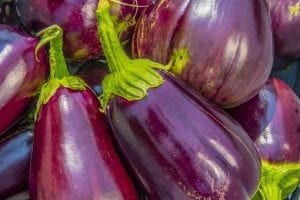Written by Marcia J. Egles, MD. Study shows eggplant to be a safe treatment for blood pressure and mental health.
 A recent small clinical study demonstrated a small reduction in blood pressure through the consumption of eggplant powder. This randomized, placebo-controlled, double-blind 12-week study from Japan also reported psychological improvements attributed to eggplant powder 1.
A recent small clinical study demonstrated a small reduction in blood pressure through the consumption of eggplant powder. This randomized, placebo-controlled, double-blind 12-week study from Japan also reported psychological improvements attributed to eggplant powder 1.
Worldwide, hypertension (high blood pressure) is a disease which accounts for over 9 million deaths annually 2. Hypertension is a main contributor to stroke, heart disease and kidney failure. Lifestyle modifications such as dietary changes can help reduce high blood pressure 3. There have been no prior clinical studies examining eggplant (Solanum melongena) as a means to improve hypertension. It has been previously reported that eggplant is rich in choline esters, including acetylcholine, and has an antihypertensive effect in rats 4.
The recent Japanese trial randomly assigned 100 mildly hypertensive participants to receive either daily eggplant powder or daily placebo for 12 weeks. The participants were generally healthy men and women, with an average age of 54, with untreated high normal to grade 1 hypertension. High normal to grade 1 hypertension was defined as baseline systolic blood pressure measurements within the range of 130 millimeters mercury (mm Hg) to 159 mm Hg. Baseline diastolic blood pressures ranged from 85 mm Hg to 99 mm Hg. (In a blood pressure measurement, for example 110/70, 110 is the systolic and 70 is the diastolic measurement.)
The eggplant participants ingested capsules containing eggplant powder in a dosage of 1.2 grams per day, which would be a dosage of 2.3 mg of acetylcholine per day. The daily dose was reported to be equivalent to 22 grams per day of raw eggplant. The placebo group ingested dextrin powder placebo capsules that contain no acetylcholine or other potentially medicinal compounds. Neither the researchers nor the participants knew the identity of the capsules in this double-blind study. The daily dosage consisted of four capsules- two to be taken after breakfast and two at bedtime.
Blood pressure measurements were performed twice daily at home with automatic blood pressure cuffs, and at hospital check-ups. Additionally, participants completed food frequency questionnaires and psychiatric and mood assessment questionnaires throughout the course of the study. Comprehensive assessments were conducted at baseline, at weeks 4,8,12 and at 16 weeks.
At several points in the study, statistically significant blood pressure reductions were documented in the eggplant powder group as compared to the placebo group. For example, diastolic blood pressure was reduced at week 8 in the eggplant subgroup (p less than 0.001) who had high normal baseline blood pressure. At week 12 both systolic and diastolic blood pressures were lowered in the eggplant group (p = 0.041) participants who had grade 1 hypertension at baseline. The highest magnitude of the average differences in the primary endpoint, the hospital blood pressure measurements, was about 6mm Hg between the eggplant treated group as compared to the control. The secondary outcomes, the home blood pressure measurements, were also improved by eggplant intake. At week 16 follow-up, one month after the 12-week course was completed, there were no statistically significant differences between the eggplant group and the control group.
Also documented in the eggplant powder group were small but statistically significant improvements in mood and psychological stress levels as measured by the subjective questionnaires completed by the participants.
The researchers suggest that the high acetylcholine content of eggplant is related to the anti-hypertensive and psychological benefits. In the prior rat study, 4 dietary acetylcholine lowered blood pressure by suppressing sympathetic nervous activity through the M3 muscarinic acetylcholine receptor in the digestive system. This receptor stimulates the parasympathetic nervous system to signal the brainstem to reduce sympathetic activation. The researchers plan to conduct continued research on the mechanisms of acetylcholine and other neurotransmitters found in eggplant.
One participant in the eggplant group discontinued the study because of hives, but otherwise, no potential adverse side-effects were reported. The researchers expect that eggplant will contribute as a safe treatment for high blood pressure and for mental health 1.
Source: Nishimura, Mie, Miho Suzuki, Ryuto Takahashi, Shohei Yamaguchi, Kazufumi Tsubaki, Tomoyuki Fujita, Jun Nishihira, and Kozo Nakamura. “Daily Ingestion of Eggplant Powder Improves Blood Pressure and Psychological State in Stressed Individuals: A Randomized Placebo-Controlled Study.” Nutrients 11, no. 11 (2019): 2797.
© 2019 by the authors. Licensee MDPI, Basel, Switzerland. This article is an open access article distributed under the terms and conditions of the Creative Commons Attribution (CC BY) license (http://creativecommons.org/licenses/by/4.0/).
Click here to read the full text study.
Posted March 9, 2020.
Marcia Egles, MD, graduated from Vanderbilt University School of Medicine in 1986. She completed her residency in Internal Medicine at St. Louis University Hospital. Dr. Egles is certified in Internal Medicine and is a member of the American College of Physicians. She resides in Avon, IN with her husband and two sons.
References:
- Nishimura M, Suzuki M, Takahashi R, et al. Daily Ingestion of Eggplant Powder Improves Blood Pressure and Psychological State in Stressed Individuals: A Randomized Placebo-Controlled Study. Nutrients. 2019;11(11):2797.
- WHO. A global brief on hypertension: Silent killer, global public health crisis. 2013.
- Mohamed S. Functional foods against metabolic syndrome (obesity, diabetes, hypertension and dyslipidemia) and cardiovasular disease. Trends in Food Science & Technology. 2014;35(2):114-128.
- Yamaguchi S, Matsumoto K, Koyama M, et al. Antihypertensive effects of orally administered eggplant (Solanum melongena) rich in acetylcholine on spontaneously hypertensive rats. Food chemistry. 2019;276:376-382.
